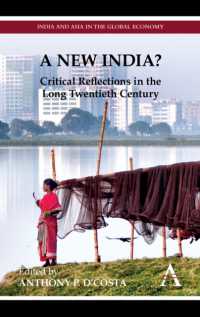- ホーム
- > 洋書
- > 英文書
- > Business / Economics
Full Description
Creativity, innovation and change are vital to the development and sustainability of all organizations. Yet, questions remain about exactly how novelty comes about, and what dynamic processes are involved in its emergence?
Ideas of emergence and process, drawn from a variety of different philosophic traditions, have been the focus of increasing attention in management and organization studies. These issues are brought to bear on novelty and innovation in this volume by examining new organizational and product development processes, whether planned or unplanned.
The contributions in this volume offer both theoretical insights and empirical studies on, inter alia, innovation, music technology, haute cuisine, pharmaceuticals and theatre improvisation. In doing so, they throw light on the importance of emergence, improvisation and learning in organizations, and how both practitioners and scholars alike can best understand their own assumptions about process. In addition, the volume includes general essays on process perspectives in organization studies.
Creativity, innovation and change are vital to the development and sustainability of all organizations. Yet, questions remain about exactly how novelty comes about, and what dynamic processes are involved in its emergence?
Ideas of emergence and process, drawn from a variety of different philosophic traditions, have been the focus of increasing attention in management and organization studies. These issues are brought to bear on novelty and innovation in this volume by examining
Contents
1: Raghu Garud, Barbara Simpson, Ann Langley, and Haridimos Tsoukas: Introduction: How does Novelty Emerge?
2: Suzanne Guerlac: Time of Emergence/ Emergence of Time: Life in the Age of Mechanical (re)Production
3: John Shotter: On "Relational Things:" a New Realm of Inquiry - Pre-Understandings and Performative Understandings of People's Meanings
4: Aris Komporozos-Athanasiou and Marianna Fotaki: Imagination in Organizational Creativity: Insights from the Radical Ontology of Cornelius Castoriadis
5: Jaan Valsiner: Negotiating Novelty: How Cultural Psychology Looks at Organizational Dynamics
6: Trevor Pinch: Between Technology and Music: Distributed Creativity and Liminal Spaces in the Early History of Electronic Music Synthesizers
7: Deborah Dougherty: Taking Advantage of Emergence
8: R. Keith Sawyer: How Organizational Innovation Emerges Through Improvisational Processes
9: Isabelle Bouty and Marie-Léandre Gomez: Creativity at Work: Generating Useful Novelty in Haute Cuisine Restaurants
10: Chris Mowles: The Paradox of Stability and Change: Elias' Processual Sociology
11: Dvora Yanow: After Mastery: Insights from Practice Theorizing
12: Jorgen Sandberg, Bernadette Loacker and Mats Alvesson: Process Here, There and Everywhere: Entangle the Multiple Meanings of 'Process' in Identity Studies







